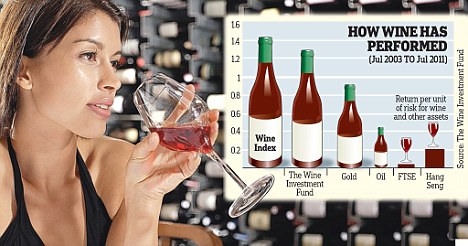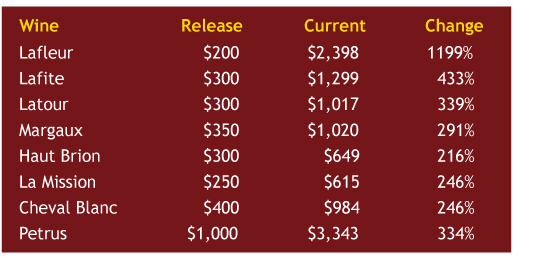It is my considered opinion that investing in wine should only be pursued if you have a passion for wine and enjoy sharing it with family and friends.
Much like art, and the fact that art appeals to a variety of sectors each possessing widely differing tastes, inclinations, and personalities, wine itself is similarly varied and for the most part, what you will find wonderful about the wine you choose
to appreciate is for the most part subjective.  This is a fact that can make
it difficult for wine investors to forecast a return on their investment. So the best advice is to learn what you like and why you like it, then to invest in what you like, whether your inclination is to favor a rich and bold Cabernet Sauvignon, or a
sophisticated and intriguing Pinot Noir. In other words, the principle to put into play at the very beginning of your wine investment journey is to invest in wine that you would not mind drinking yourself.
This is a fact that can make
it difficult for wine investors to forecast a return on their investment. So the best advice is to learn what you like and why you like it, then to invest in what you like, whether your inclination is to favor a rich and bold Cabernet Sauvignon, or a
sophisticated and intriguing Pinot Noir. In other words, the principle to put into play at the very beginning of your wine investment journey is to invest in wine that you would not mind drinking yourself.
If you are serious about wine investing for profit, then educate yourself! Do your own research and then share your observations and opinions with other wine investors and wine appraisers. Be goal specific: What are you trying to achieve? What kind of return on your investment do you hope to achieve? Large and long-term? Or modest and short-term?Some
say that if you are looking for a large return on your investment in wine then you should give serious consideration to purchasing well-known vintages that have received high scores from wine critics. Tip: When it comes to “wine-scoring,”
the famed Robert Parker has been the go-to expert for more than 30 years. Investment-grade wine can be seen as a commodity that has a reasonable chance of appreciating in value over the medium-to long-term⎯typically
at least five years. Scores above 95 are considered investment grade but you’ll soon come to see that the greatest appreciation in value occurs for wines that have achieved a perfect score of 100.
What are you trying to achieve? What kind of return on your investment do you hope to achieve? Large and long-term? Or modest and short-term?Some
say that if you are looking for a large return on your investment in wine then you should give serious consideration to purchasing well-known vintages that have received high scores from wine critics. Tip: When it comes to “wine-scoring,”
the famed Robert Parker has been the go-to expert for more than 30 years. Investment-grade wine can be seen as a commodity that has a reasonable chance of appreciating in value over the medium-to long-term⎯typically
at least five years. Scores above 95 are considered investment grade but you’ll soon come to see that the greatest appreciation in value occurs for wines that have achieved a perfect score of 100.
Wine provenance, storage, tax, costs of acquisition and re-sale are all factors that need to be considered and planned for in advance in order to obtain the wine investor’s ultimate goal. Only 1% of wine production makes the cut for investment quality
wine. Even at 1% that number is large. Every year over 34 billion bottles of wine are produced! Thus there are over 300 million bottles of wine that would make the investment grade cut. 
Like other alternative assets, wine is only worth what someone is willing to pay to acquire it. Renowned critics can influence the value of the wine investment. A poor review and subsequent reduced scoring can cause the price of that vintage to plummet. The five-year appreciation with respect to the year 2000 vintage (since release) provides an example of the gains that can be realized with other good vintages.
If you are interested in learning more about wine investing, simply contact us and send us your question. We will do our best to respond.
... The alluring prospect of physically tasting one’s investment just about outweighs most anything for me. Here is a key thing to think about…. the available quantity of fine wines continues to shrink day by day, and as history has revealed, in a weak or strong economy, people will continue to drink!
The alluring prospect of physically tasting one’s investment just about outweighs most anything for me. Here is a key thing to think about…. the available quantity of fine wines continues to shrink day by day, and as history has revealed, in a weak or strong economy, people will continue to drink! these are the collectors who learn about wine through friends, through weekend trips to various wine countries, and then, as years pass, realize that they love wine; the palate has matured and one’s enjoyment has therefore become more refined. The majority of collectors are practical, casual collectors ⎯ fantastic! But where does one go from here?Understanding the class of wines is of foremost importance, so here come the “IGWs,” defined as investment grade wines. The best place to start is by honing in on what type of wines are investment grade wines. Hint: Bordeauxs and California cult wines are the most in-demand wines for financial return.
these are the collectors who learn about wine through friends, through weekend trips to various wine countries, and then, as years pass, realize that they love wine; the palate has matured and one’s enjoyment has therefore become more refined. The majority of collectors are practical, casual collectors ⎯ fantastic! But where does one go from here?Understanding the class of wines is of foremost importance, so here come the “IGWs,” defined as investment grade wines. The best place to start is by honing in on what type of wines are investment grade wines. Hint: Bordeauxs and California cult wines are the most in-demand wines for financial return. Additionally, These “reference points” also help establish the economic value of the selected vintage.
Additionally, These “reference points” also help establish the economic value of the selected vintage.  In an earlier article I wrote about Penfolds' $108,000 offering:
In an earlier article I wrote about Penfolds' $108,000 offering:  At its best, the art and science of wine blend together and become a compound inseparable from each other, and thus, like art, wine at times often transcends our ability to measure its quality empirically. Sometime ago I wrote an article called “The rating of wine … where does one begin?”
At its best, the art and science of wine blend together and become a compound inseparable from each other, and thus, like art, wine at times often transcends our ability to measure its quality empirically. Sometime ago I wrote an article called “The rating of wine … where does one begin?”  Needless to say, wine ratings are important and do have measurable effects on the economics of a wine.
Needless to say, wine ratings are important and do have measurable effects on the economics of a wine. 